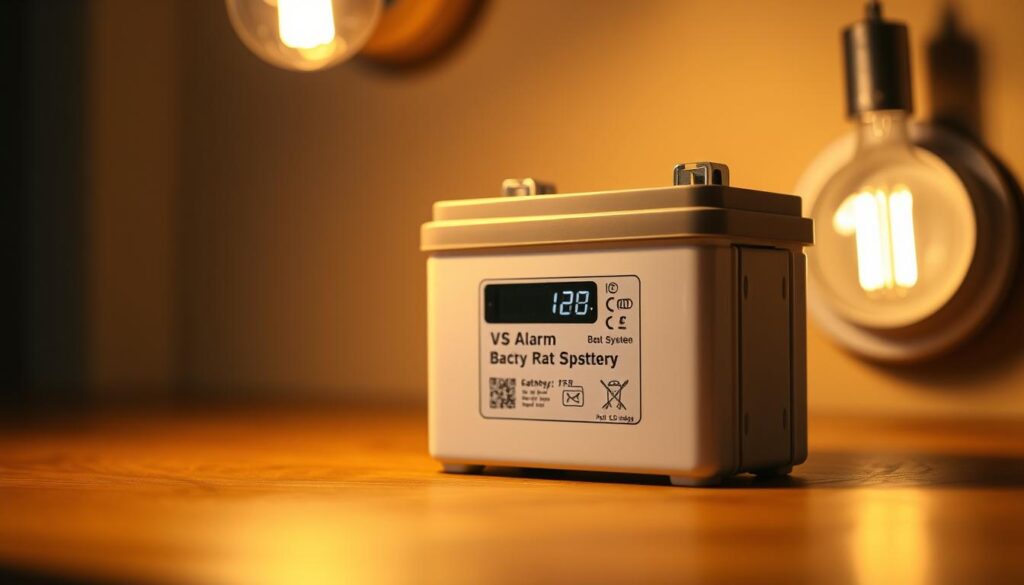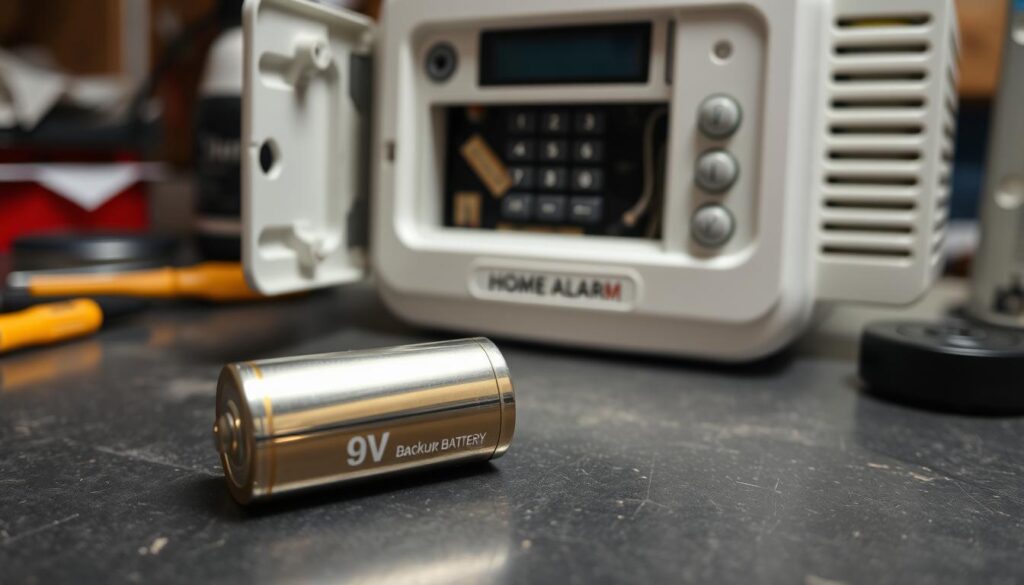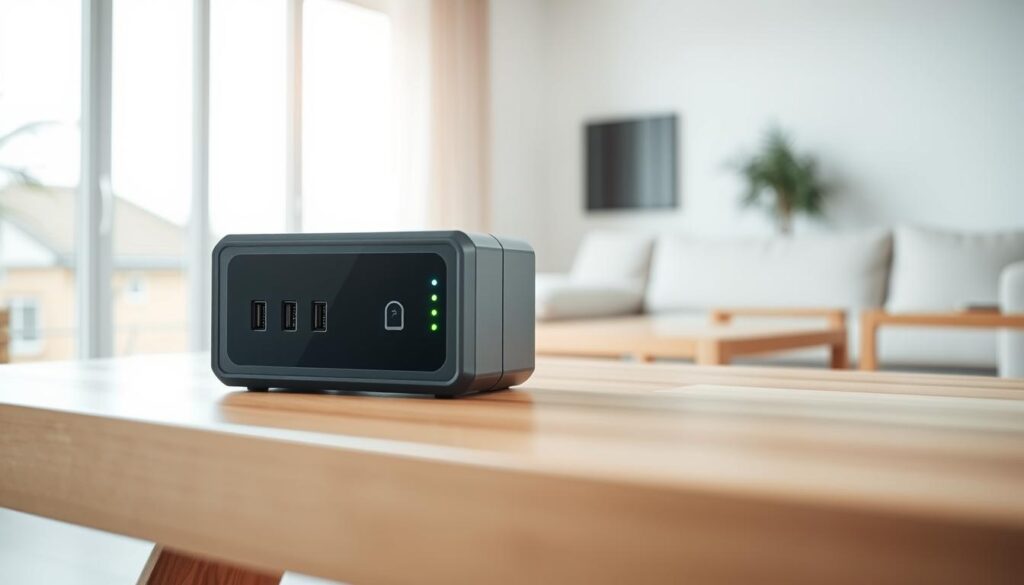When the power fails, your security system should continue to safeguard your property, but is it ready for the challenge? A crucial component of this readiness is the backup battery that powers your alarm system during outages.
You rely on your security system to protect your home and loved ones, but without a properly functioning backup battery, it may fail when you need it most. Regularly checking your alarm system’s battery ensures it remains operational, providing you with continuous protection and peace of mind.
Key Takeaways
- Regular testing of your alarm system’s backup battery is crucial for maintaining continuous protection.
- A well-maintained backup battery ensures your security system remains operational during power outages.
- Understanding how to test your backup battery helps extend the life of your security system.
- Proper battery maintenance prevents false alarms and system failures.
- UK home security systems rely heavily on backup power sources during power cuts.
Understanding the Importance of Backup Batteries in Home Security Systems
Backup batteries are a vital component of your home security system, acting as a failsafe during power outages to ensure continuous protection. In the event of a power failure, these batteries serve as the critical backup for your home alarm system, maintaining its functionality.
What Do Alarm Backup Batteries Do?
Alarm backup batteries are designed to provide power to your home security system when the mains electricity is interrupted. A fully charged backup battery can keep your alarm system operational for up to 12 hours without mains power, ensuring your home remains protected during outages. Batteries in wireless sensors are their sole source of power, highlighting their importance in overall system functionality.
How Long Should Backup Batteries Last?
The lifespan of backup batteries varies depending on their type and usage. Typically, alarm panel batteries last between 4 to 5 years, while wireless sensor batteries need replacing every 18 to 24 months, depending on activity levels. Regular testing is essential to ensure these batteries remain in good condition, maintaining the reliability of your home security system.
- Backup batteries ensure your home security system remains operational during power outages.
- A fully charged backup battery can support your alarm system for up to 12 hours.
- Understanding battery types helps maintain comprehensive home security.
- Alarm panel batteries typically last 4-5 years, while sensor batteries last 18-24 months.
Types of Batteries in UK Home Alarm Systems
UK home alarm systems rely on multiple types of batteries to ensure comprehensive security coverage. The type and number of batteries used can vary depending on whether you have a wired or wireless alarm system.
Main Alarm Panel Batteries
The main alarm panel battery is the most critical component, powering the central control unit. Typically, these are 12V sealed lead-acid batteries with capacities ranging from 2.1Ah to 7Ah.
Bell Box Batteries
Bell box batteries provide backup power to your external siren, ensuring it continues to alert neighbours during a break-in even if the main power is cut. These batteries are crucial for maintaining the effectiveness of your alarm system’s audible warning.
Wireless Sensor Batteries
Wireless sensor batteries power individual detection devices throughout your home. Different sensors require specific battery types, such as CR123A, CR2450, or AA batteries, and typically need replacing every 18 to 24 months.
Signs Your Alarm Battery Needs Testing or Replacement
It’s essential to monitor your alarm battery’s health to ensure continuous protection for your home. A failing battery can lead to reduced system performance or complete system failure. Your home security system’s effectiveness relies on the battery’s ability to provide power during outages.

Low Battery Warnings and Indicators
Modern home security systems are designed to alert you when the backup battery needs attention. Look out for a blinking “low battery” warning on your control panel. Intermittent beeping sounds from your alarm panel, typically occurring every 30-60 seconds, are another common indicator that your system battery needs replacement.
A clear sign of a failing battery is the green power light on your alarm panel flickering or failing to illuminate steadily, even when mains power is connected.
System Performance Issues
Performance issues can also signal a deteriorating battery condition. Delayed sensor responses, false alarms, or system resets during minor power fluctuations are all indicative of a battery nearing the end of its life. If your system fails to operate during a brief power outage or requires frequent resetting, it’s a definitive sign that your backup battery needs testing or replacement.
Regular testing becomes particularly important for batteries approaching the 3-4 year mark, as their capacity to hold charge diminishes significantly after this period.
How to Test Home Alarm Backup Battery: Step-by-Step Guide
Testing your home alarm backup battery is a straightforward process that can be completed in a few steps. Ensuring your home security system is functioning correctly is vital for continuous protection.
Putting Your System in Test Mode
Before testing, contact your alarm monitoring company to put your system in test mode. This prevents false alarm dispatches and ensures a smooth testing process.
Testing Battery Performance During Power Loss
Turn off the mains power to your alarm circuit and verify the green power light is off. Press and hold the test button for up to 10 seconds to ensure the alarm sounds while running on battery power.
Checking Battery Connections
Inspect the battery connections for signs of corrosion, loose terminals, or damage. Ensure all connections are clean and secure to maintain optimal performance.
By following these steps, you can ensure your home alarm backup battery is functioning correctly and your security system remains reliable.
Tools and Materials Needed for Battery Testing and Replacement
To ensure a smooth battery testing and replacement process for your home alarm system, it’s crucial to have the right tools and materials at hand. This preparation helps prevent damage to sensitive electronic components and ensures your safety during the process. Gathering the necessary tools and materials beforehand will make the task more efficient.
Essential Tools for Safe Battery Handling
Essential tools include insulated screwdrivers (flathead and Phillips), protective gloves to prevent electrical shock, a digital multimeter for checking voltage, and electrical tape for securing connections. These tools facilitate a safe and efficient battery testing and replacement process for your home security system.
Replacement Battery Selection Guide
When selecting a replacement battery, ensure it matches the original battery’s voltage, capacity (Ah rating), and terminal configuration. Most UK home security systems use 12V sealed lead-acid batteries with capacities between 2.1Ah to 7Ah. Refer to your system’s manual or manufacturer’s guidelines for specific requirements to ensure compatibility with your alarm system.
The cost of a replacement burglar alarm battery typically ranges between £12 and £30, depending on the type and make. If you opt for a professional to change the battery and perform a system check, the call-out cost can range from £99 to £109, varying by location within the UK.
Step-by-Step Battery Replacement Procedure
Replacing the battery in your home alarm system is a straightforward process that requires some preparation. Before starting, it’s crucial to understand the steps involved to ensure a smooth replacement process.
Preparing Your System for Battery Replacement
To begin, notify your alarm monitoring company to place your system in test mode. This prevents false alarm dispatches during maintenance. Ensure your system is powered down by disconnecting the mains power supply or unplugging the transformer.
Removing the Old Battery Safely
Access your alarm panel using the appropriate tools, typically a screwdriver or security key. Locate the backup battery inside the main control unit. Carefully disconnect the old battery by removing the negative (black) terminal first, followed by the positive (red) terminal.
Installing and Connecting the New Battery
When installing the new battery, connect the positive (red) terminal first, followed by the negative (black) terminal. Ensure the connections are secure but not overtightened. After installation, close the panel securely and restore mains power.

As emphasized by security experts, “A well-maintained alarm system is crucial for home security.” Regular battery replacement is a key aspect of this maintenance. By following these steps, you can ensure your alarm system continues to function correctly, providing you with peace of mind and continuous protection for your home.
| Step | Description |
|---|---|
| 1 | Notify your alarm monitoring company to place your system in test mode. |
| 2 | Power down your system by disconnecting the mains power supply. |
| 3 | Access the alarm panel and locate the backup battery. |
| 4 | Disconnect the old battery and replace it with a new one. |
Common Battery Issues and Troubleshooting
Troubleshooting battery problems is essential for maintaining the effectiveness of your home alarm system in the UK. Several common issues can arise, and understanding how to address them can help ensure your system’s continuous operation.
Battery Not Holding Charge
If your alarm system battery fails to hold a charge, it may be due to parasitic drains within your system or faulty charging circuits. Checking for these issues can help resolve the problem. You can also test the voltage output of your replacement battery with a multimeter to ensure it’s delivering the correct voltage, typically 12V for most UK alarm systems.
System Continues to Show Low Battery Warning
Persistent low battery warnings after replacement often indicate connection issues, incompatible battery specifications, or problems with the system’s charging circuit. Verifying the battery connections and ensuring the replacement battery is compatible with your system can help resolve this issue.
Alarm Triggering During Power Outages
When your alarm triggers repeatedly during minor power fluctuations or outages, it typically suggests the backup battery cannot maintain stable voltage during the transition from mains to battery power. Checking the battery’s condition and ensuring it’s suitable for your system can help prevent this issue.
| Issue | Cause | Solution |
|---|---|---|
| Battery Not Holding Charge | Parasitic drains or faulty charging circuits | Check for drains, test voltage output |
| Low Battery Warning | Connection issues, incompatible battery | Verify connections, check compatibility |
| Alarm Triggering During Outages | Backup battery unable to maintain voltage | Check battery condition, ensure suitability |
Maintaining Your Alarm System’s Battery Health
Maintaining your alarm system’s battery health is vital for continuous home security. A well-maintained battery ensures that your system remains operational during power outages, providing uninterrupted protection for your property.
Regular Testing Schedule
Implementing a regular testing schedule is crucial for identifying potential issues before they become critical. You should test your main panel battery quarterly and wireless sensors semi-annually. Mark these dates on your calendar or set digital reminders to ensure you never miss a test.
Extending Battery Life
To extend the life of your alarm system batteries, maintain optimal environmental conditions. Ensure your alarm panel has adequate ventilation and avoid exposing it to extreme temperatures. During extended absences, keep your alarm system connected to mains power to prevent unnecessary battery drain. Consider scheduling annual professional maintenance checks with your alarm monitoring company to ensure all batteries and charging circuits are functioning optimally.
Conclusion: Ensuring Continuous Protection for Your Home
A well-functioning home alarm system is vital for protecting your property and loved ones. To ensure continuous protection, maintain your alarm system’s backup battery by following the guidelines outlined in this article. This keeps your security system operational during power outages.
Different components have varying battery lifespans; for instance, panel batteries typically last 3-5 years, while wireless sensor batteries need replacement every 18-24 months. For areas with frequent power outages, consider upgrading to newer battery technologies or enhanced capacity options. Many UK homeowners also benefit from combining regular self-testing with annual professional maintenance checks to ensure their security system remains in optimal condition.
For more detailed information on maintaining your home alarm system and maximizing its battery life, you can visit this resource for additional guidance.



